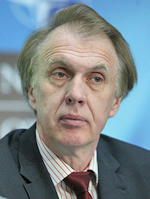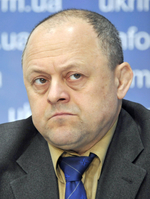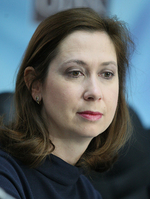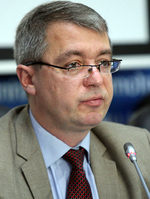On April 12 journalists were presented with an analysis of the results of monitoring the 2016 Annual National Program of Ukraine-NATO Cooperation (ANP). Incidentally, an ANP has also been drawn up for 2017. But the grassroots, who are being regularly told about a supposedly steady course towards NATO, hardly know about the real work the state is doing to this end. Moreover, failure of the legislative bodies to clearly spell out Ukraine’s plans to integrate into NATO still more “defocuses” this matter. Even as Ukraine is in fact at war with Russia, no laws set out that NATO membership is Ukraine’s ultimate goal. Instead, an evasive formula was found – meeting NATO membership criteria. The impression is that, since the presidency of Leonid Kuchma, who deleted the clear-cut objective of joining the Alliance from the Military Doctrine after speaking with Putin in Crimea, the leadership has been doing nothing but spouting formal rhetoric.
Undoubtedly, it is impossible to join NATO unless these criteria have been met. So why has the emphasis been shifted? This only increases the impression of ordinary people, most of whom, according to polls, favor Ukraine’s accession to NATO, that the tops are “playing” with NATO integration rather than really striving for this. And the question is not only in that generals and officers will have to drop old principles and reform. The question is whether the leadership is afraid to incur the wrath of the aggressor by smoothing over differences in the law. At least experts are concerned about this.
In two hours, the speakers, among whom were noted experts, academics, ex-ministers, and NATO representatives in Ukraine, who had expertly analyzed this document, expressed a lot of critical opinions.
“I was involved in drawing up the Annual National Program of Ukraine-NATO Cooperation as far back as  2009, and I must say I did not and do not like this document,” said Volodymyr OHRYZKO, former Minister of Foreign Affairs. “From the very beginning, this document turns into a ‘hotchpotch’ to which all kinds of things are added – with a hope that somebody will do this. I agree that it is the country, not the army or the foreign ministry, that enters NATO. A lot of time has lapsed since we began to chart these annual national programs. We have many other instruments that allow us to fulfill the elements of this ‘hotchpotch.’ Besides, we have an interesting document called EU Association Agreement. If you compare the structure of this agreement with that of the ANP, you will see that many things were simply copied from one document to the other. Is there any reason to do this? I don’t think so. The ANP is supposed to answer the key question: in what way will this document help Ukraine approach NATO standards, with emphasis being put on the crucial part, not on the reform of the judicial system or the election law? So when we look on it as a general-nature document, I don’t think we are thus approaching NATO standards. Of course, the ANP did and will play its role, but I think it still remains somewhat unmotivated.
2009, and I must say I did not and do not like this document,” said Volodymyr OHRYZKO, former Minister of Foreign Affairs. “From the very beginning, this document turns into a ‘hotchpotch’ to which all kinds of things are added – with a hope that somebody will do this. I agree that it is the country, not the army or the foreign ministry, that enters NATO. A lot of time has lapsed since we began to chart these annual national programs. We have many other instruments that allow us to fulfill the elements of this ‘hotchpotch.’ Besides, we have an interesting document called EU Association Agreement. If you compare the structure of this agreement with that of the ANP, you will see that many things were simply copied from one document to the other. Is there any reason to do this? I don’t think so. The ANP is supposed to answer the key question: in what way will this document help Ukraine approach NATO standards, with emphasis being put on the crucial part, not on the reform of the judicial system or the election law? So when we look on it as a general-nature document, I don’t think we are thus approaching NATO standards. Of course, the ANP did and will play its role, but I think it still remains somewhat unmotivated.
“As for the mechanics of this document, it is in fact a collection of information from all the ministries and agencies about what they will be doing in line with the governmental policy towards NATO. This document does not compel ministries to act one way or another. It only gathers and generalized information. The formula ‘to extend’ and ‘to improve’ provides no clear-cut criteria for encouraging concrete officials to fulfill the plan of actions. If we want to be pragmatic and realistic, we should think how to concretize things. For example, the 2017 document at least has supplements, i.e., a tentative action plan of sorts. But still, we won’t find any deadlines there. We only keep on saying that something will be done within a year. It is very difficult for the civic sector to understand what has been done. The feedback we have from our agencies does not allow us to draw a true conclusion about whether the work done was effective. I am convinced that we should begin to reconsider what is being done – otherwise, we will be making circles for another 15 years or so and will come to nothing. In particular, I want the media to report that the 2017 ANP has the following sentence at last (even though it is almost lost in the text): the strategic goal of Ukraine is acquisition of NATO membership. This is already a major victory.”
So the problem is that there are neither deadlines nor criteria to bring into motion the algorithm of integration into NATO. But there are certain statements and documents. Of course, the question is not in the Institute for Euro-Atlantic Cooperation and other institutions that are supposed to be a link in cooperation with the Alliance. The problem is in the political will, or, to be more exact, weakness, of the leadership. The present experts were trying to show journalists a detailed analysis of the actions this document envisions. The point is not only in the military and security matters which the document’s main chapters deal with. The point is in a series of reforms in the political, electoral, legal, and other fields. As it has been repeatedly said at this kind of forums, everything hinges on reforms in the country and fighting corruption. Ukrainians have long been regarding these calls as populist mantras, whereas they are basic conditions from the viewpoint of the West. The question is how to measure the abovementioned tasks and the fulfillment of them. By the number of joint war games and the caught bribe-takers? Or by high-quality algorithms with concrete deadlines?
 Leonid POLIAKOV, former first deputy Minister of Defense of Ukraine, put emphasis on, among other things, systemic corruption in portfolio-distribution bodies, which influences the appointment of certain persons. “No matter how much we bustle, we can change nothing,” Poliakov says. “Personnel reserves, commissions, and councils have been set up for form’s sake, but only one commander makes all decisions – as was the case in the Soviet Union. What is more, this commander is not directly responsible for anything and can evade responsibility at any moment.”
Leonid POLIAKOV, former first deputy Minister of Defense of Ukraine, put emphasis on, among other things, systemic corruption in portfolio-distribution bodies, which influences the appointment of certain persons. “No matter how much we bustle, we can change nothing,” Poliakov says. “Personnel reserves, commissions, and councils have been set up for form’s sake, but only one commander makes all decisions – as was the case in the Soviet Union. What is more, this commander is not directly responsible for anything and can evade responsibility at any moment.”
“A program of the armed forces development has been drawn up. Then it is approved, and everybody cries out a hurrah. Then this document is submitted to parliament full of politicians obsessed with ‘pitchforks’ and utility charges. How many of these deputies really care about national security? Unfortunately, it is now easier for the military than for civilians to pressure MPs,” Poliakov emphasized. Mr. Poliakov’s last phrase is significant, for it lays bare a real danger – when the grassroots are unable to influence the authorities, they prefer to resort to force or violence. Naturally, the Alliance is minutely studying these tendencies, especially taking into account the Ukrainians’ inclination to Maidans. For this very reason, when the West speaks of reforms, it usually means not reforms themselves but guarantees of the predictability of processes in Ukraine.
 One of the first to speak at the briefing was Barbora MARONKOVA, the newly-appointed Director of the NATO Information and Documentation Center in Ukraine, who assured the audience that the ANP is not just a set of formal intentions but a real step towards reforms. Interestingly, the decisive moment for carrying out reforms is the so-called constitutional reform. Its main purpose is to ward off usurpation of power and ensure the unity of governmental policies. The pressure on Ukraine from both sides – the West and Russia – in an attempt to change our Constitution is, of course, a major problem, which far from all are aware of.
One of the first to speak at the briefing was Barbora MARONKOVA, the newly-appointed Director of the NATO Information and Documentation Center in Ukraine, who assured the audience that the ANP is not just a set of formal intentions but a real step towards reforms. Interestingly, the decisive moment for carrying out reforms is the so-called constitutional reform. Its main purpose is to ward off usurpation of power and ensure the unity of governmental policies. The pressure on Ukraine from both sides – the West and Russia – in an attempt to change our Constitution is, of course, a major problem, which far from all are aware of.
According to Volodymyr HORBACH, a political analyst at the Institute of Euro-Atlantic Cooperation, a number of reforms are making progress. But when experts often speak about these reforms, more and more questions arise about whether these changes can have a real impact on our defense capability. Is the emphasis on “strengthening,” “improving,” and “ensuring” a diversion of sorts, while nothing is changing in essence and things haven’t got forward an inch?
 It is Oleksandr SUSHKO, director of the Institute of Euro-Atlantic Cooperation, who used the words “strengthening” and “improving” to point out that abstractness and vagueness are the main drawback of such programs, although the developers tried to avoid them.
It is Oleksandr SUSHKO, director of the Institute of Euro-Atlantic Cooperation, who used the words “strengthening” and “improving” to point out that abstractness and vagueness are the main drawback of such programs, although the developers tried to avoid them.
What standards can we talk about if Ukraine has not yet appointed key security officials, including its official representative in NATO? One can try to explain this flaw in any possible way, but, no doubt, the Alliance itself is looking captiously at this uncertain behavior of Kyiv. And the abovementioned formula of NATO accession criteria, not of the accession itself, only adds to the picture of governmental apathy to this course. But the question is not only in Ukraine’s representative in NATO. No ambassadors have so far been appointed to some countries that are our strategic partners and neighbors – for example, Belarus. Besides (this remark was made at the press conference), the Ukrainian leadership has not yet appointed the chief of the intelligence service, in spite of the fact that we are waging a war for the fourth consecutive year. It must be stressed that NATO standards are not a formal set of requirements. It is first of all a clear and convincing vector for the government which must understand that a modern war is based on not only guns, tanks, and missiles. A modern war is a war of information, analysis, and propaganda. On the other hand, another fact should be noted for fairness’ sake. Ukraine has proved that it is capable of repelling the aggression of a powerful enemy, which also means that this undeclared war is setting new standards and principles of resistance which the Alliance itself could learn.








